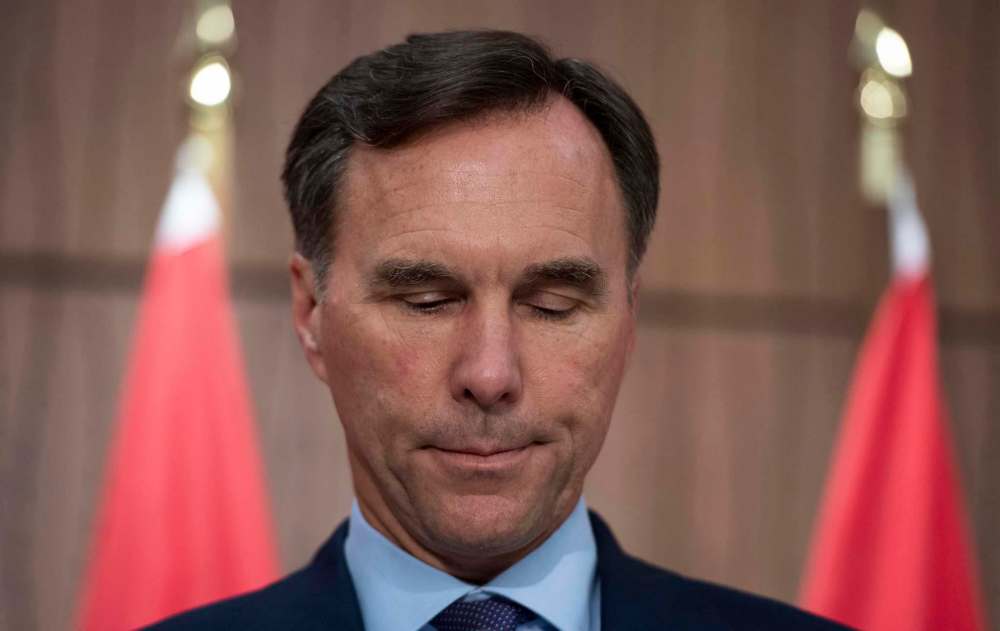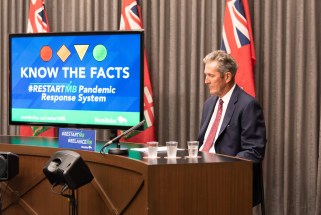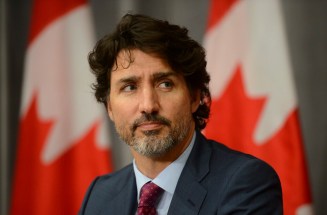Good, bad, ugly of Trudeau’s political woes
Read this article for free:
or
Already have an account? Log in here »
To continue reading, please subscribe:
Monthly Digital Subscription
$0 for the first 4 weeks*
- Enjoy unlimited reading on winnipegfreepress.com
- Read the E-Edition, our digital replica newspaper
- Access News Break, our award-winning app
- Play interactive puzzles
*No charge for 4 weeks then price increases to the regular rate of $19.00 plus GST every four weeks. Offer available to new and qualified returning subscribers only. Cancel any time.
Monthly Digital Subscription
$4.75/week*
- Enjoy unlimited reading on winnipegfreepress.com
- Read the E-Edition, our digital replica newspaper
- Access News Break, our award-winning app
- Play interactive puzzles
*Billed as $19 plus GST every four weeks. Cancel any time.
To continue reading, please subscribe:
Add Free Press access to your Brandon Sun subscription for only an additional
$1 for the first 4 weeks*
*Your next subscription payment will increase by $1.00 and you will be charged $16.99 plus GST for four weeks. After four weeks, your payment will increase to $23.99 plus GST every four weeks.
Read unlimited articles for free today:
or
Already have an account? Log in here »
Hey there, time traveller!
This article was published 19/08/2020 (1939 days ago), so information in it may no longer be current.
Under siege due to ethical transgressions and questionable use of parliamentary mechanisms, Prime Minister Justin Trudeau is quickly composing a melodrama worthy of the legendary Sergio Leone, creator of the iconic Spaghetti Western genre.
In other words: a political story that features the good, the bad, and the downright ugly.
In brief, Trudeau and now former finance minister Bill Morneau became entangled in a scandal surrounding the decision to award WE Charity, a youth-oriented international development organization, a $43-million contract to manage a student summer employment program worth $900 million.

WE paid Trudeau’s brother, mother, and wife speaking fees or travel expenses; Morneau accepted free trips and travel expenses, and one of his daughters is directly employed by the charity.
Despite a clear conflict of interest, the Trudeau-led Liberal government awarded the contract to WE without a tendering process.

The fallout has Trudeau on the run, and prompted Morneau to resign his cabinet post and retire from politics.
The glimmer of good in this tortured story, such as it is, comes by way of new Finance Minister Chrystia Freeland — the first woman to hold the key cabinet post considered by most political observers to be the second-most powerful job in the federal government.
After only six years in politics, Freeland used her role as deputy prime minister to become the premier whisperer, earning praise from some of the country’s most intractable provincial leaders.

In the bad category, we can justifiably place Trudeau, Morneau, and the members of their families that fed robustly at the WE trough.
For many observers, the purpose and value of WE was hard to define. The charity did a lot of work to mobilize youth on issues such as social justice and international development. It did this by conscripting an impressive list of celebrities from politics, sports, arts and culture and business.
Given WE’s addiction to all forms of glitterati, it’s hardly surprising Trudeau and his family would want to be included; Trudeau clearly loves being considered more than just an elected official.
He is, however, primarily an elected official — and is governed by the rules that govern other elected officials. That is ultimately what the WE story is all about.

It bears mentioning this is not Trudeau’s first trip to the ethics woodshed. The prime minister has repeatedly shown a willful blindness when it comes to the principles of ethics.
It’s not that awarding the WE contract is remarkable in and of itself; it is Trudeau and his staff did not see why it was wrong to award the contract to WE.
Which brings us now to the ugly: Trudeau’s decision to prorogue Parliament to avoid having to answer questions from opposition MPs.
Prorogation is one of the tools available to a prime minister to manage the affairs of federal Parliament. However, like omnibus bills and snap election calls, it’s a blunt instrument that must be wielded judiciously.
It’s not that awarding the WE contract is remarkable in and of itself; it is Trudeau and his staff did not see why it was wrong to award the contract to WE.
Asking for and receiving permission from the Governor General to shut down Parliament unilaterally, and for purely partisan reasons, can easily qualify as an affront to democracy. That is certainly the case here.
Trudeau claimed prorogation was necessary to reboot Parliament and allow him an opportunity to bring in a new throne speech, which outlines the governing party’s agenda. The only problem is Trudeau does not need to prorogue Parliament to accomplish those goals.
Opposition MPs were swarming around the WE scandal, demanding documents and preparing for a good old-fashioned spit roast at committees of the House of Commons. Desperate to change the channel, Trudeau has chosen to use a weapon of mass political destruction rather than good old-fashioned issues management (a less sexy but ultimately more effective approach).
With a majority mandate, prorogation would not be much of an issue, other than having to suffer allegations about how it is perverting democracy. Previous first ministers, most notably former Conservative prime minister Stephen Harper, used prorogation several times to avoid opposition scrutiny in the House of Commons.
Trudeau claimed prorogation was necessary to reboot Parliament and allow him an opportunity to bring in a new throne speech, which outlines the governing party’s agenda. The only problem is Trudeau does not need to prorogue Parliament to accomplish those goals.
However, having promised a throne speech, Trudeau, leader of the minority government, now has to face a vote of confidence. With the Conservatives about to pick a new leader, and the electorate growing more cynical by the day, that may prove to be a fatal strategic mistake.
Although it would be hard to say prorogation on its own hurt Harper, it did not help him. In the 2015 election, Harper’s decision to prorogue Parliament four times became prima facie evidence of a leader who had grown too hard and desperate for Canadians to support.
With their chronic and indifferent ignorance of the fundamentals of ethical behaviour, and a decision to abuse the tradition of prorogation, Trudeau and the Liberals may have written themselves a similar ending.
dan.lett@freepress.mb.ca

Born and raised in and around Toronto, Dan Lett came to Winnipeg in 1986, less than a year out of journalism school with a lifelong dream to be a newspaper reporter.
Our newsroom depends on a growing audience of readers to power our journalism. If you are not a paid reader, please consider becoming a subscriber.
Our newsroom depends on its audience of readers to power our journalism. Thank you for your support.







